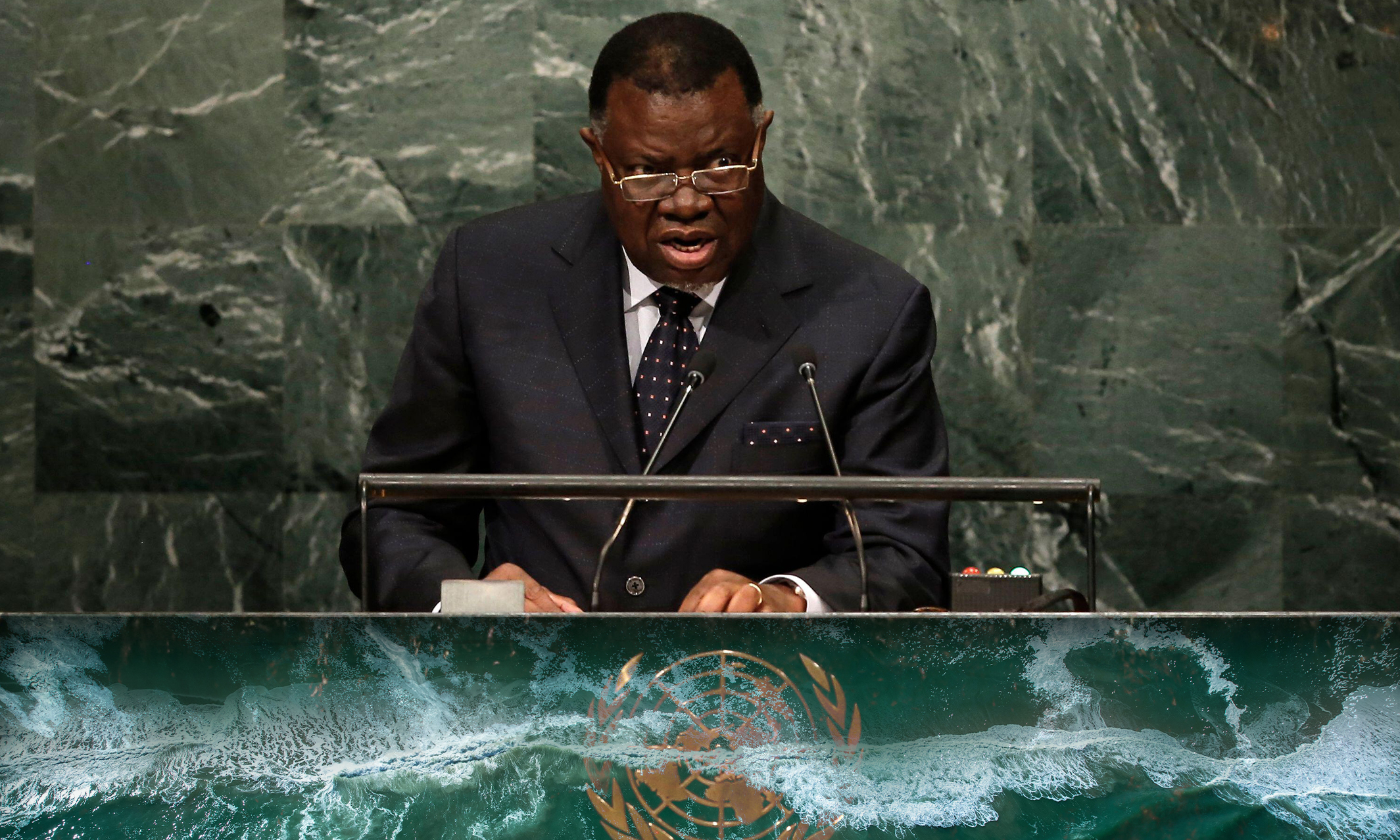By Khadija Sharife (OCCRP), Mark Anderson (OCCRP), and The Namibian |
A few days after Christmas in 2016, two men met in the VIP area of the Shimmy Beach Club in the swanky waterfront district of Cape Town, South Africa. They were plotting how they might divert state funds to keep Namibia’s president, Hage Geingob, in power.
Gathered at the posh club overlooking the Atlantic Ocean sat Sacky Shanghala, Namibia’s attorney-general at the time, and James Hatuikulipi, then chairman of the board of the state-owned National Fishing Corporation of Namibia (Fishcor).
With them was Adriaan Louw, a Namibian businessman with decades of experience in southern Africa’s fishing sector.
There, they formulated the first stages of a scheme that would channel millions of dollars from Namibia’s lucrative fishing industry to the ruling South West Africa People’s Organisation (SWAPO), according to a lawyer who later became part of the deal and had direct knowledge of the meeting.
Born of Namibia’s movement for independence from apartheid South Africa, SWAPO had run the country since the 1990s. The following November, the party was due to hold a congress to pick its presidential candidate for national polls in 2019.
Whoever was chosen was virtually guaranteed to win the election. But with Namibia reeling from a devastating drought and an economic crisis that had sent youth unemployment soaring, Geingob, who had first been elected in 2014, was facing strong opposition within his own party.
So, a new investigation by OCCRP and The Namibian has found, some of the president’s most trusted advisers devised a scheme to siphon off millions of dollars from the country’s fishing industry to finance his re-election.
Bank statements, invoices, internal correspondence, and government documents show that top government officials set up several SWAPO-controlled companies that received nearly US$4.5 million skimmed from a $637 million fishing deal between the state-owned Fishcor and Louw’s company, African Selection Fishing.
Some of this money, leaked notes from party officials show, was allegedly then handed to SWAPO electors in what appears to have been a vote-buying campaign ahead of the party’s 2017 congress.
Geingob emerged as the winner of the vote — and Namibia’s presidential election two years later — in part because the party was “hijacked with money,” according to former SWAPO Secretary-General Pendukeni Iivula-Ithana.
“We learned that people were given envelopes with money after the congress,” she told The Namibian. “One did just not know where that money had come from. All the signs were there that there was money being splashed.”
Namibian authorities are investigating the fishy scheme, the details of which have never been made public before. It is the subject of an ongoing court case, but no charges have been brought.

Namibia’s Anti-Corruption Commission (ACC), which has probed the deal, declined to comment, saying all the information it had on the case had been handed to prosecutors.
A spokesperson for President Geingob denied the allegations, calling his record on fighting corruption “unblemished,” but declined to comment in detail as they are part of an ongoing legal case.
“At no point did the President instruct or ask someone to engage in fraudulent activities,” spokesperson Alfredo Hengari said in an email. “That is contrary to the values and principles of President Geingob, who has dedicated his entire life to Effective Governance and was also instrumental in setting up the anti-corruption mechanisms in Namibia.”
Hatuikulipi and Shanghala, two of the men who met in Cape Town to plan the scheme,are both in jail awaiting trial over a separate scandal involving Fishcor, the Fishrot bribery scandal.
Their lawyer did not provide a comment in time for publication, and attempts to reach them by personal email were unsuccessful.
Louw, the third man involved in the deal, denied being involved in anything improper, saying he was “unaware of any alleged corrupt dealings at Fishcor” when he entered into the deal and only started to suspect years later that anything was wrong.
“I have always confirmed my willingness to assist in any investigation,” he said in a written response to OCCRP. “We want to reiterate that we have not benefited one dollar from any of the alleged corrupt activities and to the contrary have suffered massive losses.”
SWAPO’s spokesperson, Deputy Minister of Defense Hilma Nicanor, didn’t respond to repeated attempts to seek comment.
Payments Like ‘Telephone Numbers’
Namibia’s SWAPO-led government has faced allegations of cronyism and elite self-enrichment for years, but “the boss,” as Hatuikulipi and Shanghala called President Geingob, wanted a more efficient way for the party to bring in cash.
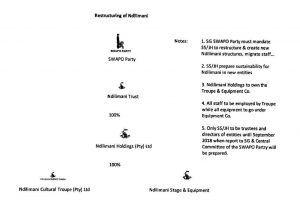
Around the same time as the Cape Town meeting, Geingob asked the two men to design a corporate structure that would help him capture more public funds for the party, according to a lawyer who worked on the deal.
The request was made simpler by the fact that Namibia had no transparency laws around campaign financing at the time.
Hatuikulipi soon got to work. He set up a holding company, Ndilimani — which means “dynamite” in the Oshiwambo language spoken in northern Namibia — that would be entirely owned by SWAPO.
Ndilimani, in turn, secretly controlled several corporate vehicles that received funds from Fishcor. It even had its own cultural troupe — which also received payments.
Private correspondence shows that Shanghala and Hatuikulipi also asked a trusted lawyer to set up a shell company that would become instrumental in SWAPO’s fishing scheme: Celax Investments.
The two men would control Celax, even as the lawyer owned it on paper.
Then, in January 2017, Hatuikulipi and Shanghala arranged for Fishcor to go into business with Louw.
On paper, the Namibian businessman seemed like the ideal partner: He had a long track record in the fishing industry and, according to the court documents, had already been promised preferential access to Namibia’s fish by the Minister of Fisheries at the time, Bernhard Esau.
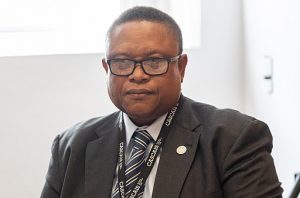
But Louw had also faced a string of lawsuits in Angola related to his fishing companies. (He told reporters the suits had been settled.)
Together, the three men formed Seaflower Pelagic Processing (SPP), a public-private joint venture between Fishcor and Louw’s company, African Selection Fishing.
Under the original terms of the venture — which Hatuikulipi wrote on official Fishcor letterhead before Shanghala approved them and personally communicated them to the Minister of Fisheries — African Selection Fishing would be the majority shareholder of Seaflower, owning 60 percent, while Fishcor would own 40 percent.
The same month Seaflower was set up, in January 2017, then-Minister of Fisheries Esau awarded Fishcor a license to catch 50,000 metric tons of horse mackerel per year for 15 years, which it then shared with its new partner, African Selection Fishing, which would run the fishing operation.
At a market rate of $850 per ton, this would be worth some $637 million.
The award was given without a competitive bidding process, in violation of Namibian laws. Thanks to recent legislative changes, the terms of the deals were kept secret.
Crucially, the government agreed to subsidize the companies’ losses if they failed to catch the entire quota, allowing African Selection Fishing to later claim extra quotas from the government, worth millions of dollars more.
The fishing quotas promised to be a boon for those involved. The lawyer who worked on the deal was told he stood to receive payments the size of “telephone numbers.”
To fatten the deal, the officials included a provision that African Selection Fishing would build a fish processing factory for Fishcor.
Under the terms of the joint venture agreement, African Selection Fishing would loan the money to build the factory, to be repaid later, which could have created an incentive for the company to inflate the cost of the factory.
The Government Gazette listed the cost of constructing the factory at N$530 million (US$40.4 million), but independent valuators said the true figure could be nearly six times less.
Louw justified the high cost of the factory by saying they used construction costs to pay for hundreds of employees, and because it was a frozen fish processing plant and so had high overhead costs.
“This was not preferential treatment, it was based on costing of the project and sustained employment of 700 workers,” he told OCCRP.
OCCRP could not verify the veracity of Louw’s claims.
In 2017, Fishcor bought local company Etale Properties’s shares in the factory for N$160 million ($13 million) — double what Etale’s director had paid for the property two years earlier — raising questions about its true value.
Around the time the Seaflower venture was formalized, Celax Investments — the company that would end up siphoning money to pay off the SWAPO voters — was secretly brought in as a partner.

Because it was black-owned, Celax was given 25 percent of African Selection Fishing’s shares in Seaflower to comply with planned “empowerment” legislation, which would require companies in important sectors to be at least a quarter owned by “racially disadvantaged persons.
” Though the requirement is still not law, in practice it has become common in Namibia to bring in “empowerment partners.”
A source with knowledge of the deal said Celax never made any payment for its stake in Seaflower. Celax’s involvement in the joint venture was hidden until several years later, when it was revealed by an affidavit sent to the Anti-Corruption Commission.
Louw told OCCRP that Celax Investments “was meant as a reserve vehicle” until Namibia’s empowerment laws were passed, and his company had received annual confirmations that it was not active. He added that he had no “benefit or interest in these shares.”
A lawyer for Esau declined to comment in detail for this article, as the matter is part of an ongoing case, except to say the former fisheries minister “vehemently denies all allegations against him” and will respond to them “at the appropriate forum and time.”
In August 2018, African Selection Fishing reported it had incurred losses because it had caught less fish than it was allowed, and claimed more quotas worth nearly $42 million as compensation.
As part of the claim, African Selection Fishing also requested a reduction in Fishcor’s revenue from the joint venture. (Asked to comment on this, African Selection Fishing’s Louw claimed that Fishcor, which officially held the quotas, had corruptly reallocated them to third parties linked to SWAPO.)
Namibia’s High Court ruled in August 2020 that the entire deal between Fishcor and African Selection Fishing was “a cosy and parasitic” relationship possible only “under a corrupt environment.”
A False Stream
Hatuikulipi also sought to capture several other government revenue streams using apparently corrupt deals.
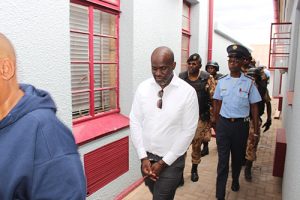
In January 2019, Hatuikulipi told the same trusted lawyer involved in the fishing quota scheme about a natural gas deal that might soon require a corporate vehicle, presenting an opportunity to profit.
“With the benefit of hindsight, I can only assume that it was because of a referral by Shanghala and Hatuikulipi, who were aware that I would be a paymaster using my trust account,” said the lawyer.
In October of that year, not long before Namibia voted to re-elect Geingob as president, around $69 million was deposited into an account in the name of the lawyer at Kazakhstan’s Kaspi Bank as part of the supposed gas deal, according to online banking screenshots obtained by OCCRP.
The money was allegedly paid by a Japanese pharmaceutical company as part of a deal for liquified natural gas supplied by Qatar-based Barzan Energy & Gas through a Bulgarian company, Imperial Ventures.
But there is no evidence that the gas in question actually existed. It’s unclear why a Namibian vehicle would need to be involved in a gas deal, anyway, especially given that Namibia is not a gas exporter or trading hub.
The lawyer said he was told the deal hit a snag when the gas arrived in Japan and the buyers said it was of poor quality.
Hatuikulipi told the lawyer to pay $230,000 from his own account towards the cost of purifying the gas, but he said it was unsuccessful and the money was lost.
The lawyer’s name was removed from the Kaspi Bank account that received the $69 million deposit, and it’s unclear who currently controls it.
The details of the account given in email correspondence seen by reporters, including the bank’s email addresses, web domain and telephone numbers, do not match those listed on Kaspi Bank’s official website.
Namibia’s Anti-Corruption Commission said it was investigating a bank account in Kazakhstan.
“Government Objectives”
In June that year, Fishcor began to divert money from the fishing deal through Celax to entities controlled by or linked to SWAPO.
Banking records show that Celax received N$200,000 (US$15,800) with “Fishcor” noted as a reference for the payment on June 30, 2017.
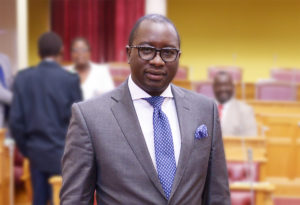
The following day, Shanghala sent the lawyer who set up Celax a list of 17 recipients who had performed services for SWAPO and were to receive transfers from the company.
More deposits then started to appear in Celax’s accounts. Some referenced Fishcor, while others gave more cryptic descriptions, such as “celax gov obj” and “pmt gov obj,” in what appear to be references to payments for “government objectives.”
Bank records analyzed by OCCRP show that the lawyer made more than 37 payments to 18 companies and individuals on behalf of Celax, totalling some N$58 million ($4.5 million), between July 2017 and November 2018.
Most of the recipients have since been implicated in the Fishrot scandal, including a firm allegedly co-owned by Hatuikulipi named MH Properties, which received N$8 million (US$576,000) from Celax on October 23, 2017, a month before the SWAPO party congress.
Several people with ties to SWAPO also received money for party-related activities, banking records show.
On August 4, 2017, the lawyer received a deposit of N$14 million (US$1.04 million) in his law firm’s trust account from Mermaria Seafood Nam, a local fishing company owned by Samherji, the Icelandic firm at the center of the Fishrot scandal.
Hatuikulipi instructed the lawyer to send the N$14 million (US$1.04 million) to Celax’s bank accounts a day later.
WHATSAPP EXCHANGE (EDITED FOR CLARITY):
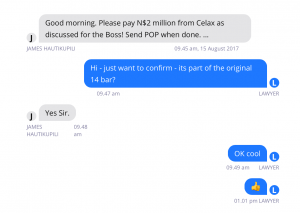
JAMES HAUTIKUPILI (09.45 am, 15 August 2017, left hand side): Good morning. Please pay N$2 million from Celax as discussed for the Boss! Send POP when done. …
LAWYER (09.47, right hand side): Hi – just want to confirm – its part of the original 14 bar?
JAMES HAUTIKUPILI (09.48, left): Yes Sir.
LAWYER (09.49, right): OK cool
LAWYER (01.01PM, right): THUMBS UP EMOJI
CAPTION: WhatsApp messages between then Fishcor chairman James Hatuikulipi and a SWAPO-connected lawyer about payments from Celax. The reference to 14 bar means N$14 million.
In August, he made payments worth a total of around N$3.1 million (US$230,000) to four recipients: SWAPO’s Kalahari regional arm, SWAPO leader Naftal Shailemo, SWAPO’s special youth account, and the SWAPO-linked Om’Kumo Cultural Trust.
Recipients of other payments included companies that have been identified as conduits for payments to key SWAPO officials and their associates, including JTH Trading, Erongo Clearing & Forwarding, and Om’Kumo Cultural Trust.
Other payments to SWAPO moved through the accounts of a law firm run by President Geingob’s personal lawyer, Sisa Namandje. On August 4, N$2.5 million (US$185,000), with “Fishcor” listed as the creditor and “Seaflower” as the reference, was deposited into the firm’s account.
These funds were intended, in part, “as a donation for the benefit of SWAPO Party’s November 2017 Congress activities,” according to a sworn affidavit Namandje provided to the ACC.
In total, prosecutors flagged at least N$40 million (US$2.7 million) from Fishcor and Mermaria, and a further N$50 million (US$ 3.35 million) from other companies and people that passed through the trust accounts of Namandje’s firm before being sent to SWAPO-related entities.
He has not been charged with any wrongdoing, even though Namibia’s Financial Intelligence Centre has documented the funds being sent and received.
Namandje has declined to assist the ACC with its investigation, citing, among other reasons, what he said were deliberate leaks from the Financial Intelligence Centre to “law enforcement agencies,” which then shared the information with the media.
The ACC said Namandje “is not a subject of investigation at the moment.”

Namandje did not respond to requests for comment. Asked about allegations that his personal lawyer was implicated in the Fishrot scandal in July 2020, Geingob shot back at The Namibian, “Is he found guilty? Do I sleep with him? What are you talking about? What are you guys up to?”
Geingob Steals the Show
As campaigning geared up for the 2017 congress, high-ranking members of SWAPO used the network of businesses that had been siphoning off money from the fishing deal to mount a furious spending campaign to win over electors.
For a while, Celax was the primary conduit for the funds that were being siphoned off from the fishing deal. But in October 2017, the Ndilimani Trust — which had been set up by Hatuikulipi and Shanghala to serve as the party’s vehicle for collecting and distributing money — was finally registered.
They planned for Celax to become integrated into Ndilimani. Still, Celax was used to make payments meant for Ndilimani during this period, since Ndilimani’s accounts hadn’t been set up yet.
Party payments moved through Celax’s account into and out of the party’s arms in 14 regions, emails and handwritten notes by party officials show. The notes suggest they were allocated to fund SWAPO’s campaigning.
Large amounts of cash were withdrawn from Celax’s account just days before the party congress. A scribbled plan drawn up by Shanghala, titled “The Project 2017,” details N$700,000 (US$56,700) in cash payments earmarked for several of the party’s wings.
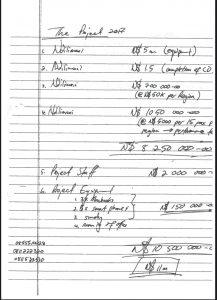
The diagram detailed how, one month before the polls, Hatuikulipi would withdraw N$500,000 (US$35,300) in cash from Celax accounts. The lawyer close to the fishing deal said the cash was intended for electors at SWAPO’s congress.
Some of the election-related transfers were made under the guise of contributions to Ndilimani Trust’s cultural troupe, giving local SWAPO officials cover to receive money discreetly.
Some of the alleged bribes that moved through the account of Namandje, Geingob’s longtime lawyer, were also used for the 2017 party congress.
Namandje himself confirmed at least N$7.5 million (US$607,500) was spent on SWAPO’s 2017 congress, and that funds from Fishcor also flowed into his firm’s trust account earmarked for SWAPO in the 2019 elections.
“SWAPO has lost moral ground — the voters now think we are all thugs who want to steal” – Namibia’s former Prime Minister Nahas Angula
The former SWAPO secretary-general, Iivula-Ithana, said the congress was rigged. “Only a fool will accept what transpired at SWAPO’s 2017 congress,” she said.
Namibia’s former Prime Minister Nahas Angula, a top SWAPO official who lost his seat at the party congress, said accusations of vote rigging have hurt the party.
“SWAPO has lost moral ground — the voters now think we are all thugs who want to steal,” he told The Namibian. “We struggle to convince voters because they think we are just enriching ourselves.”
Source: Namibian.

